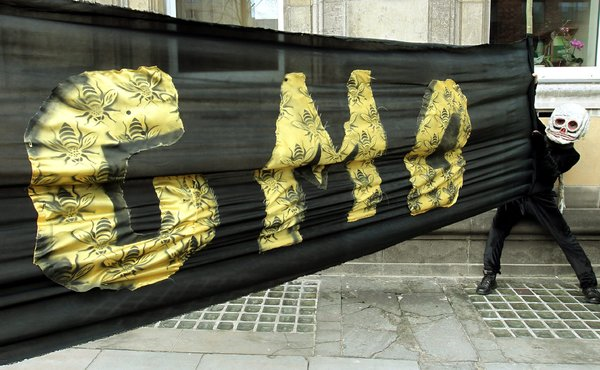Hoping to save bees, Europe to vote on neonicotinoid pesticide ban
By DAVID JOLLY
14 March 2013 PARIS (The New York Times) – Will Brussels try to give bees a break? In a case closely watched on both sides of the Atlantic, European officials plan to vote Friday on a proposal to sharply restrict the use of pesticides that had been implicated in the decline of global bee populations. The vote in Brussels, by officials from all 27 European Union member states, follows a January report from the European Food Safety Authority recommending that none of the chemicals of a class known as neonicotinoids should be used on crops that are attractive to honeybees, because of the risk the insects would be poisoned. Although even some bee scientists say the evidence is inconclusive, the European Commission, the Union’s administrative arm, has embraced the food safety authority’s findings. The proposal calls for a two-year prohibition of neonicotinoid use on the flowering crops that lure bees, as well as the seeds of such crops. That would mean, for example, that farmers could no longer use the products on the colorful fields of rapeseed, or canola, that stretch across huge areas of Europea’s agricultural heartlands. “The Commission has come to the conclusion that a high risk for bees cannot be excluded except by imposing further restrictions,” the draft proposal says. Companies that produce neonicotinoid-based pesticides, including the German giant Bayer CropScience and Syngenta, the big Swiss biochemical company, have lobbied strenuously against the moratorium. The American company DuPont is also a leading producer of the chemicals, and Monsanto incorporates it into some of the seeds it produces; in the United States, neonicotinoids are heavily used on the country’s huge corn crop. The European proposal would need the backing of a so-called qualified majority of member states to become law, a system that assigns greater voting weight to larger countries like Germany, which is said to be reluctant to back the measure. Uses of the chemicals that would be allowed under the moratorium would be restricted to professional growers, eliminating the danger that home gardeners would unwittingly wreak havoc on bee colonies. At the end of the two years, the results would be reviewed for further action. E.U. nations already have the authority to restrict neonicotinoids. Initial approval for chemicals is granted by Brussels, but responsibility for approving the commercial products that contain them rests with member states. As a result various nations, including France and Italy, already restrict their use. Germany moved to restrict the use of some products after one such pesticide was blamed for millions of bee deaths in the Rhine Valley. According to U.N. studies, bee populations — including honeybees, bumblebees and solitary wild bees — are dying in Europe, North America and around the world, with a significant upturn in mortality over the last decade. The exact reasons for the decline are unknown, but the implications are disturbing because the insects are essential for feeding the planet. The U.N. Food and Agriculture Organization says that bees pollinate 71 of the 100 crops that provide 90 percent of the world’s food. Peter Neumann, a biology professor who studies bee health at the University of Bern, Switzerland, said the extent of the bee die-off varied across Europe, but that in Switzerland, 50 percent of colonies were lost in the winter of 2011-12, compared with about 10 percent in a normal year. […] In the United States, studies by the Agriculture Department’s Bee Research Laboratory show colonies declining by as much as 30 percent annually over the last five or six years. As a result, about two-thirds of all the remaining honeybees in the country are needed in California each spring just to pollinate the state’s almond crop. […] Even if a bee does not receive enough of the poison to kill it, there is a fear that “sublethal” doses it carries back to the hive may be weakening already-stressed colonies. Two studies reported last year in the journal Science suggested that low levels of neonicotinoids from a common pesticide can have significant effects on bee colonies. […] Noa Simon, a veterinary scientist who acts as a technical adviser to the European Beekeeping Coordination, an industry group, argues that the chemicals should be banned for at least five years to provide time for further studies. “A two-year ban isn’t enough,” Ms. Simon said. The food safety authority has indicated the risks, she said, “but there are a lot of information gaps that need to be filled. And these chemicals are persistent, once they’re introduced into the soil they’re still going to be around a year later. This isn’t being taken into account.” [more]
